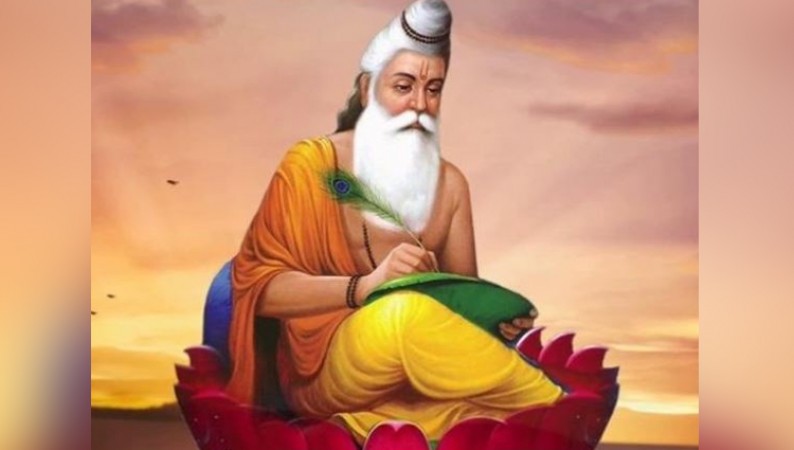
Rishi Panchmi radiates with jubilation and merriment, casting its vibrant aura across diverse corners of India and Nepal. Each locale boasts its unique significance for this exuberant festival, which primarily pays homage to the revered Sapta Rishis.
According to the Hindu calendar, the auspicious Rishi Panchami graces us on the fifth day of the Shukla Paksha, the waxing phase of the moon, during the Hindu month of Bhadrapada, spanning August to September.
In the Indian tapestry, people earnestly pay their respects to the Sapta Rishis, a septet of sagacious sages--Kashyapa, Atri, Bharadhvaja, Vishvamitra, Gauthama, Jamadagni, and Vashishta--on the splendid occasion of Rishi Panchmi. Meanwhile, in certain enclaves of Kerala, this day dons the additional mantle of Vishwakarma Puja.
Remarkably, some Indian communities, such as the Maheshwari community, intertwine Rishi Panchmi with the festivities of Raksha Bandhan. Conversely, in certain North Indian regions, Rishi Panchmi orchestrates the grand finale of a fasting period. North Indian women steadfastly observe the Hartalika Teej Vrat, a three-day fasting ritual commencing with Hartalika Teej, the third day of the Shukla Paksha in the Hindu month of Bhadrapada. Rishi Panchmi ushers in the culmination of this austere Hartalika Teej Vrat.
Not confined to the Indian subcontinent alone, Rishi Panchmi also graces the hearts of Nepalese denizens. This sacred day is devoutly dedicated to the veneration of Lord Shiva. Men and women alike embark on a solemn fast and fervently offer their prayers to Lord Shiva. The day unfurls with its own set of sacred rituals; women partake in a sanctifying bath, invoking the auspicious Datiwan herb, and some households reverently install consecrated kalash vessels before embarking on pilgrimages to Lord Shiva's hallowed abodes.
India, an illustrious custodian of culture, traditions, rituals, and spiritual practices, has received many of these sacred tenets from the luminary Rishis and Sages of antiquity. These venerable souls illuminated humanity's path, nurturing the world through their formidable tapasyas (austerities) and yagnas (sacrificial rituals), and dedicating their lives to the welfare of all. The four Vedas—Rigveda, Yajurveda, Samaveda, and Atharvaveda—which form the bedrock of Hinduism, were gifted to humanity by these sagacious Rishis, illuminating the path to enlightenment.
Indeed, Hindus regard the Rishis as their forefathers, organized into various lineages headed by these eminent sages. These lineages, or Gotras, bear the names of these Rishis, signifying their ancestral heritage. The profound belief permeates the hearts of all Hindus that their families continue to be shielded and guided by these potent Rishis even in the present day. To honor and express gratitude to these venerable sages, Rishi Panchami is celebrated annually.
This auspicious occasion graces the Shukla Panchami of the Bhadrapada month, precisely two days after Hartalika Teej and the day following Ganesh Chaturthi. On this day, Hindus from all corners of the land converge to pay homage to the Saptarishis, including Rishi Kashyapa, Atri, Baradhvaja, Vishvamitra, Gauthama, Jamadagni, and Vashistha.
Rituals
As dawn breaks on this sacred day, people rise early to engage in a ritualistic purification in the holy rivers, employing the cleansing herbs known as Upmarga for dental hygiene and Datwan for bathing. These botanical agents purify the physical vessel. Women, in particular, adhere to the tradition of applying red mud before their ceremonial ablutions. Following this, a concoction of curd, milk, basil, and butter is consumed to cleanse the inner sanctum. These rituals, meticulously observed, culminate in the worship of Lord Ganesha, the Navagrahas (nine celestial deities), the Saptarishis, and Arundhati. Fasting is a common practice on this sacred day.
The womenfolk fervently embrace this day with unwavering devotion, observing the Rishi Panchami Vrat. They hold firm to the belief that this observance absolves them of sins, whether knowingly or unknowingly accrued. In ancient times, women were prohibited from entering the household or the kitchen during their menstrual cycles, adhering to strict codes of conduct. Failure to adhere led to Rajaswala Dosha, a perceived impurity. By dutifully undertaking the Rishi Panchami Vrat, women sought liberation from this affliction. Their fasting journey commences on Hartalika Teej and reaches its culmination on this day. In some Hindu communities, this day doubles as Bhai Panchami, where women tie sacred Rakhis to their beloved brothers, entreating the divine for their longevity.
The festival of Rishi Panchami derives its significance from a profound legend, underscoring the gravity of the Rishi Panchami Vrat. In a village resided a Brahmin named Uttank, alongside his wife Sushila and a widowed daughter. One fateful night, a disconcerting sight greeted the Brahmin couple: their daughter was completely engulfed by ants. Alarmed and desperate, they sought the counsel of a learned sage. Pleading for a remedy, they were informed that this dire condition was a consequence of sins committed in the daughter's previous life, specifically, her transgression of entering the kitchen during her menstrual period. The sage prescribed a series of rituals to be performed on Rishi Panchami day as a means to cleanse her of this affliction. Filled with unwavering dedication, the widow faithfully carried out these rituals, purifying her mind, body, and soul.